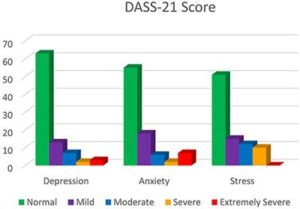Young people’s lives have recently been affected by an unseen crisis that has dimmed their dreams and ambitions. Many people are pondering the causes of this disturbing trend after noticing the rise in despair and anxiety among this group.
 In India, especially after the epidemic, 9.3 percent of young people (18 to 24 years old) reported having depression or anxiety in May 2020, according to WHO data. By March 2022, that number had risen to 16.8 percent. Concerningly more young individuals in India will experience melancholy and anxiety in 2023. Startling figures show that about a quarter of young adults between the ages of 18 and 25 are struggling with depression symptoms, indicating a significant rise from prior years. Additionally, about 30% of this group battle with anxiety problems, underscoring a disturbing rise in mental health issues.
In India, especially after the epidemic, 9.3 percent of young people (18 to 24 years old) reported having depression or anxiety in May 2020, according to WHO data. By March 2022, that number had risen to 16.8 percent. Concerningly more young individuals in India will experience melancholy and anxiety in 2023. Startling figures show that about a quarter of young adults between the ages of 18 and 25 are struggling with depression symptoms, indicating a significant rise from prior years. Additionally, about 30% of this group battle with anxiety problems, underscoring a disturbing rise in mental health issues.
Nowadays, academic endeavors are a major source of stress. Stress levels have increased as a result of the increasing pressure on students to do well academically and worries about an unstable employment market. Lack of space for self-kindness in the pursuit of perfection frequently opens the door for depressive thoughts to develop. Additionally, the depth and closeness of in-person relationships cannot be replicated in the digital era’s evolving relationship landscape, which has changed the mechanics of social interaction. In this setting, loneliness, a common prelude to melancholy and anxiety, thrives. The scarcity of adequate mental health resources and the stigma associated with getting help exacerbate the problem.
An essential first step in overcoming these difficulties is asking for help. However, barriers like stigma and limited access to mental health resources discourage many from getting the urgent help they need. Self-reliance-oriented cultures frequently prevent candid discussions about mental health, which feeds the vicious cycle of suffering in silence.
It is essential to take a diversified approach to address this mounting situation. Education about mental health should be given priority in educational institutions. Employers may help by building a culture that values work-life balance and de-stigmatizes asking for help. Destigmatizing mental health issues through open communication is crucial.
Child Rehabilitation Psychologist Anandita Chakravarty (M. Phil in Rehabilitation Psychology, National Institute of Empowerment of Persons with Intellectual Disability, under the Ministry of Social Justice and Empowerment, Government of India; Sikanderabad, Telangana) speaks with India Today NE and discusses the various stigmas associated with mental health as well as the causes of the rise in depression and anxiety among young adults in Northeast India and the rest of the nation.
































